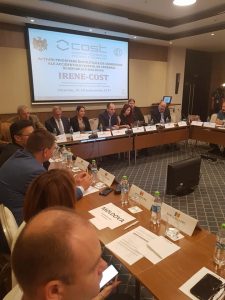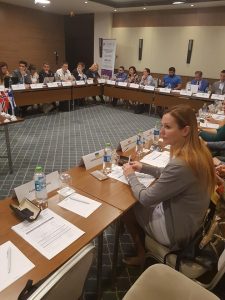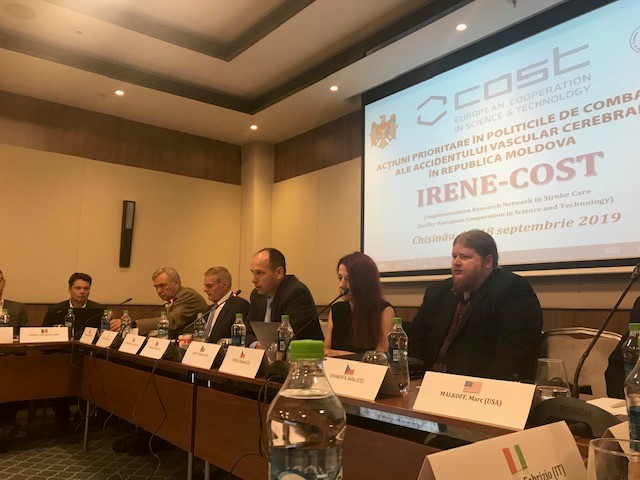Written by Prof. Anita Arsovska, MD, PhD, FESO, SAFE Board member
The Management Committee Meeting of IRENE COST Action took place in Chisinau, Moldova, 16th-17th of September 2019, hosted by Prof. Stanislav Groppa, attended by 46 delegates from 26 countries (several SAFE members), chaired and co-chaired by Robert Mikulik and Natan Bornstein, respectively.
Based on the principles of ESO-EAST platform which was created by Prof. Valeria Caso and the efforts of the Steering Committee, and also formation of RES-Q database, IRENE stands for Implementation Research Network in Stroke Care Quality. ESO and SAFE have been working together more closely in the previous years, especially since signing of the Memorandum of Understanding during ESOC 2017 in order to improve stroke care in many European countries. Effective methods for stroke treatment exist; however the implementation of these treatment methods is very low and therefore constitutes the most challenging problem in current stroke management. In many countries and many hospitals, patients do not receive effective treatment because implementation framework is missing.

Image credits: Yuriy Flomin; Source: Facebook
During the meeting, Veronika Svobodova (Grant Manager) stated that the core activity of the IRENE COST Action is to improve public health through; a) Networking which will facilitate understanding of contextual factors, in between-country differences in innovation-values fit and implementation climate, b) a quality registry that will provide a cohesive picture of the implementation of stroke treatments; followed by c) the dissemination of results to the main stakeholders (e.g. hospitals and Ministries of Health) to implement new mechanisms to improve the outcome of stroke.
The IRENE COST Action will be conducted mainly in European countries where the burden of stroke is higher, while quality of stroke care is lower and resources for healthcare are less developed compared to other European countries. IRENE COST Action will alleviate disparities in stroke care and improve outcomes after stroke. IRENE COST Action is a platform for networking with defined goals.

Image credits: Yuriy Flomin; Source: Facebook
One of the main Capacity Building Objectives is to develop tools for increasing professional skills and knowledge of IRENE COST and sharing best practice between COST members during the IRENE COST Action period. Actually, the first IRENE COST Training school “Communicating scientific data and results to the public” will be organized by SAFE’s Vice-President Markus Wagner in March next year, in his hometown Gütersloh, Germany where together with other experienced speakers he will share his rich experience and knowledge within the German Stroke Foundation in terms of improving the communication of science to the pubic and journalists. During the first day of the Training School- Principles, examples, tips and tricks in Scientific communication will be shared and during the second day lectures regarding Implementing of Stroke Services (experience from Germany), Communication and campaigning, Certification and Quality indicators will be held, presenting the the political work of SAFE in Brussels using data from the Burden of Stroke / Economic burden of Stroke and Stroke Action Plan For Europe (SAFE/ESO).
Overall, the two days intensive meeting was an excellent opportunity to meet with colleagues, make plans for future collaboration, exchange knowledge, and also and great inspiration to continue to work in order to improve the quality of stroke care in each country involved. All delegates enjoyed the warm hospitality of Prof. Stanislav Groppa and his team and were delighted by the charming city of Chisinau and its natural beauties.





